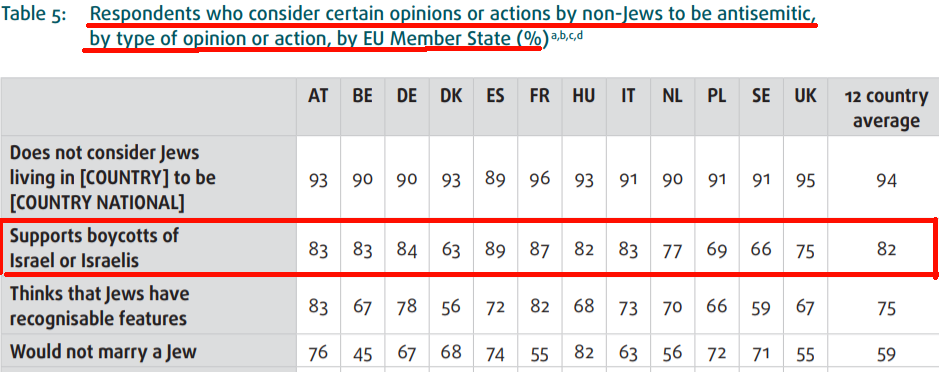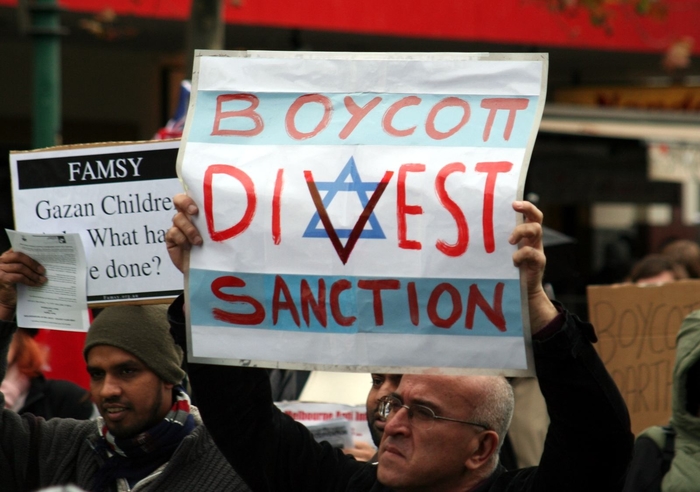Following the announcement by US Secretary of State Mike Pompeo, during his visit to Israel, that the US will now regard BDS as antisemitic, the British media continued its pattern of deceiving news consumers on the movement’s goals, and why many see it as antisemitic.
An article by the Guardian’s Jerusalem correspondent Oliver Holmes (Mike Pompeo makes unprecedented visit to settlements, Nov. 19) simply promoted claims by the BDS movement that it’s “peaceful“, and then uncritically quoted two anti-Israel NGOs (Amnesty and HRW) similarly characterising BDS as a “peaceful” “civil rights” movement.
An article in the Independent, attributed to their Foreign Desk, (US to designate Israel boycott movement BDS as antisemitic, Nov. 20), included this:
BDS organisers see their movement as a non-violent protest of Israeli’s treatment of the Palestinians, modelling on the campaign that helped end apartheid in South Africa. The Israelis see the movement as an existential threat and regularly accuse its supporters of being antisemitic, which BDS movement has vehemently denied.
The Indy, as with the Guardian, also uncritically quoted Amnesty and HRW claims that BDS is simply a “non-violent” “civil rights” movement that seeks “social justice“.
Though the Telegraph’s report on Pompeo’s announcement about BDS was a bit better than that of the Guardian and Independent, their article, by Jerusalem correspondent James Rothwell (Settlement goods in US will be labeled ‘Made in Israel’, Mike Pompeo announces on Golan Heights tour, Nov. 20) also made no real effort to explain why BDS is considered antisemitic.
Even the Daily Mail – byline: Associated Press and Daily Mail reporter – was far less than clear on why BDS is considered antisemitic, in their article (“Mike Pompeo says groups who support for boycotting Israel will be banned from getting federal cash as he makes history by visiting West Bank Jewish settlement”, Nov. 19). Whilst providing several paragraphs quoting NGOs and others who oppose classifying BDS as antisemitic, it only provided this sentence on those supporting the US decision:
Israel views BDS as an assault on its very existence, and has seized on statements by some supporters to accuse it of anti-Semitism, allegations denied by organizers.
The Financial Times’ report on Pompeo’s announcement (“Pompeo makes unprecedented visit to Israeli settlement winery in West Bank”, Nov. 19) included the briefest characterisation of BDS, one that didn’t even attempt to explain to readers why it’s often considered antisemitic:
On Thursday morning, Mr Pompeo said the US would designate as anti-Semitic a global boycott movement that seeks to stigmatise Israel for settlement-building.
Though the IHRA Working Definition can be interpreted as including BDS as an example of “Applying double standards by requiring of it a behavior not expected or demanded of any other democratic nation”, even leaving IHRA aside, there’s an undeniable correlation between the movement (and its supporters) and anti-Jewish racism.
For starters, it’s not merely, as the Daily Mail claimed, the statements of “some” BDS supporters that alarms Jews and others, it’s the leadership of the movement. BDS co-founder Omar Barghouti made it clear that the movement is not a benign civil rights movement seeking fair treatment of Palestinians, but, rather, one which opposes the existence of a Jewish state within any borders.
Denying that the Jewish state has a right to exist is explicitly categorized as antisemitic by the IHRA working definition.
It’s not just Barghouti.
In fact, journalists genuinely interested in reporting on the movement would be hard pressed to find many local BDS leaders who support a two-state solution and Israel’s right to exist.
Further, CST and the Institute for Jewish Policy Research (JPR) produced a major study on antisemitism in Great Britain, which included “robust empirical documentation” on the link between antisemitic and anti-Israel attitudes in the country. The study demonsrated that those who hold extreme anti-Israel views (such as supporting BDS) are dramatically more likely than the rest of the population to also hold classic antisemitic views.
Additionally, the high number of anti-Israel, BDS-supporting activists who have expressed antisemitic views on social media has been continually documented by researchers such as David Collier. In the US, the most prominent pro-BDS group on campus, Students for Justice in Palestine (SJP), has a long and well-documented record of supporting antisemitic terrorist groups, and engaging in antisemitic rhetoric, including but not limited to comparing Israel to Nazi Germany.
This is vital context in understanding why so many Jews associate BDS with antisemitism.
Indeed, when it comes to Jewish opinion, the view of BDS is clear. In a comprehensive 2018 poll of European Jews by the European Agency for Fundamental Rights, 82% of Jews expressed their view that boycotts targeting Israel are antisemitic.

It seems that, even avoiding the question of whether BDS is intrinsically antisemitic, at the very least, media outlets should take European Jewish opinion of BDS into account when explaining and contextualising the movement.
Ignoring Jewish opinion on the organised effort to vilify, ostracise, and isolate the Jewish state – and only the Jewish state – would be akin to ignoring African-American opinion when reporting on the debate over Confederate flag. In the latter case, even if some were to argue that there are many white Americans in southern states whose support for the flag isn’t motivated by racism, it’s also undeniable that most Black Americans strongly associate it with racism, segregation and slavery.
Though BDS and the Confederate flag are substantively far different issues, the comparison is instructive because they are both highly emotive to Jews and African-Americans respectively.
Most Jews see BDS through the lens of history, informed by painful memories of anti-Jewish measures in pre-Emancipation Europe, explicitly antisemitic boycotts of Jews under the Nazis, and anti-Jewish boycotts by Arab states opposed to Jewish sovereignty (which actually was initiated several years before Israel declared statehood).
The burden of proof should be on Palestinians and their allies who support BDS to demonstrate why, though Jews are being boycotted, they’re not really ‘boycotting Jews’; why the minority uniquely impacted by their political assault is not really their target; why this time is not like the other times.




